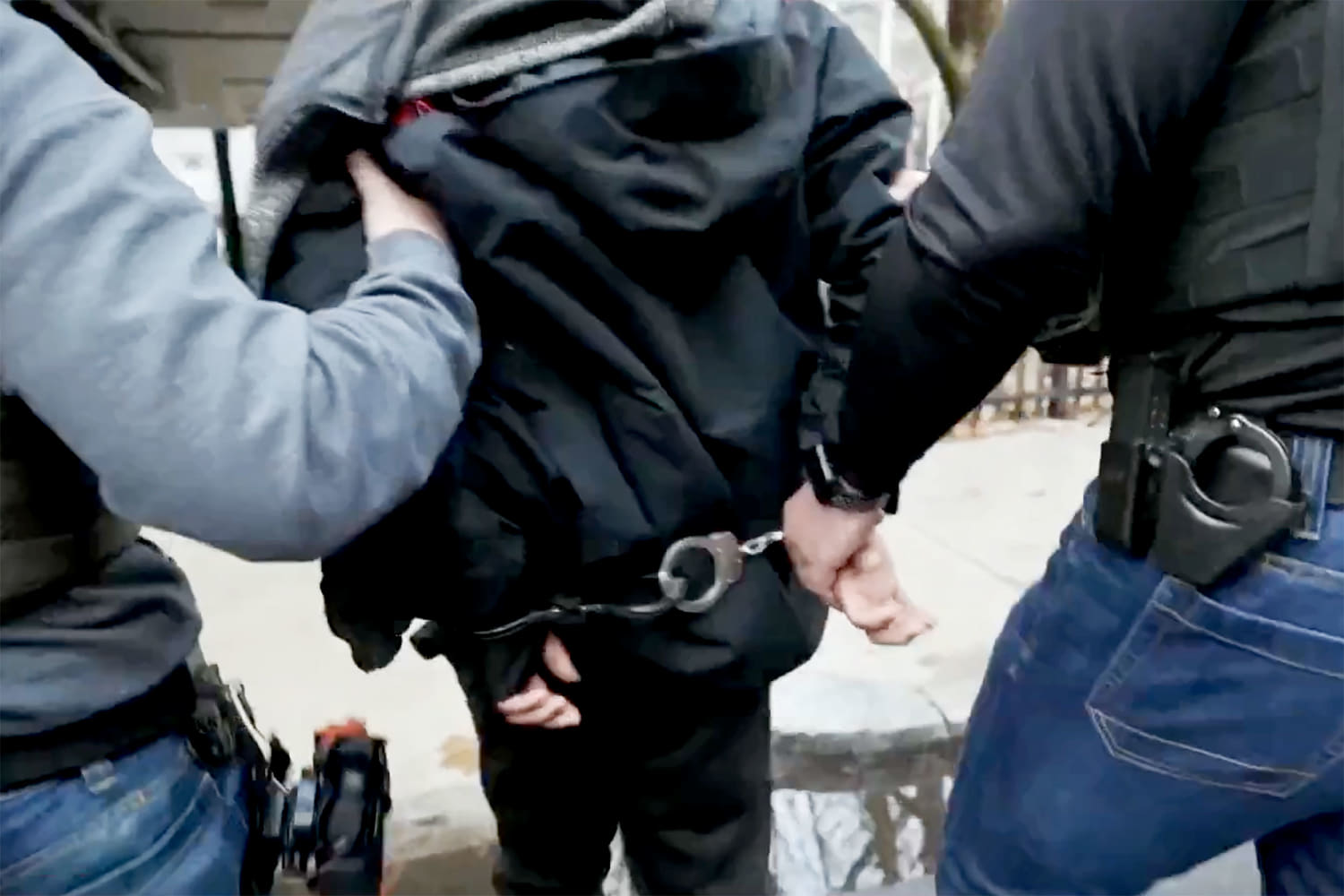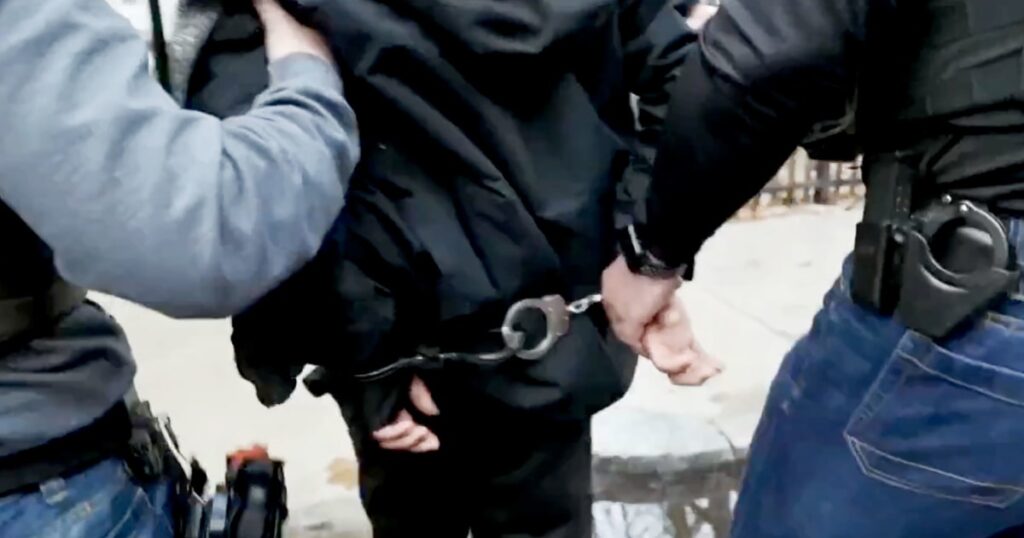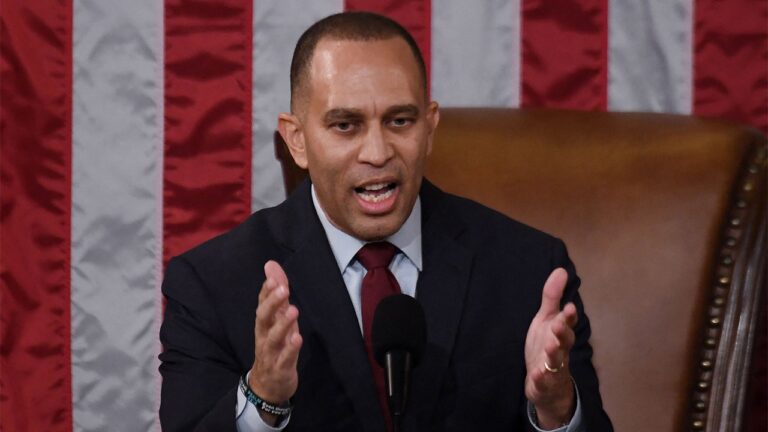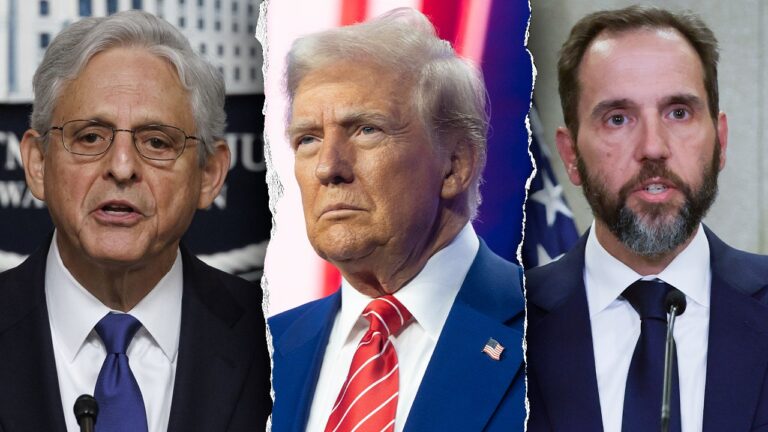
CHELSEA, Mass. — The operation begins before dawn.
More than a dozen agents with Immigration and Customs Enforcement — or ICE — gear up in a parking lot in suburban Boston for what the agency calls “targeted enforcement.”
This week, NBC News was given access to one of those operations. Agents spent hours waiting for their targets to leave their homes and head to work, revealing the time and labor-intensive effort it takes for federal agents to apprehend individuals who could be eligible for deportation.
It took about 16 ICE agents an entire morning to arrest five immigrants who they said were undocumented, had criminal records, and had been released on bail by local jurisdictions instead of being turned over to federal authorities. Each of the immigrants required 40 to 80 hours of surveillance before agents made the arrests, said Todd Lyons, ICE’s acting assistant director of field operations for enforcement removal operations.
“ICE doesn’t do blanket sweeps,” Lyons insisted. “We don’t do large-scale roundups. Every individual that’s here today has come to our attention because they’ve been arrested by a local municipality for a felony or an egregious crime.”
But there are mounting questions about how these operations will change once President-elect Donald Trump takes office — and whether agents will continue to focus on immigrants with criminal records. As the incoming administration touts its plans for mass deportations, these daily enforcement operations showcase the logistical challenges that already bog down a controversial agency that has been both reviled by immigrant advocates and praised by Trump supporters.
“When jurisdictions don’t cooperate with us, we have to go out into the community, which puts our officers at risk,” Lyons said.
The agency’s resources have been stretched thin for years, but the problem is growing more acute. ICE agents don’t talk about specifics of how their policies might change during the Trump administration, but they expect to be busy. Still, the agency will face a major obstacle in carrying out Trump’s mass deportation plans: before he even takes office, ICE is already dealing with a $230 million budget shortfall, according to two U.S. officials familiar with the figure.
While a program that allows local law enforcement to partner with ICE is expected to be ramped up to help with manpower, a battle is brewing between some local jurisdictions and federal authorities. With Trump taking office in about a month, his incoming border czar, Tom Homan, is doubling down on his threat to prosecute elected officials who impede his mass deportation plan.
“Bottom line is,” Homan said Tuesday on Fox News, “if they cross that line and knowingly harbor and conceal an illegal alien, well, I’m going to seek prosecution.”
NBC News previously reported the incoming Trump administration plans to scrap a long-standing policy that has prevented ICE agents from arresting undocumented people at or near so-called sensitive locations, including houses of worship, schools, and hospitals.
Since Trump was elected, immigration advocacy groups like New England Justice for Our Neighbors have seen a dramatic increase in requests for their services.
“Our calls have tripled since the election,” said Valerie Napier, the group’s legal director. “The past few weeks have been extremely busy. We’re receiving a lot of people who are worried about what’s going to happen in January.”
Napier herself came to the U.S. from Haiti with her family when she was 12. As an immigration lawyer, she helps immigrants seeking humanitarian-based visas.
“The majority of the clients that we’re representing right now are children under the age of 18,” she said in an interview. “We have to speak to their parents, and a lot of the parents that we’ve spoken to so far are also undocumented.”
Napier is concerned about the possibility of what’s known as “collateral” arrests that could come with such a widespread operation.
“I understand that they say they’re looking for people with criminal records,” she said. “But would ICE just turn away if they find someone who has no criminal record but who’s undocumented?” she asked.
Currently, it’s an open question that depends on many factors. Among them: detention bed space, congressional funding and agreements with other countries to receive deportations.
“What we are focused on is public safety and national security threats,” said Lyons, the ICE official, whose name had also been floated as a possible ICE director in the Trump administration. (Trump picked ICE veteran Caleb Vitello to serve as the acting director.) “But then there are those who have exhausted all legal means. They’ve gone through immigration system, through appeals, through stays. In the end, they’ve been ordered legally removed from the United States. And we’ll go ahead and effect those removal orders.”
Over the last several years, Boston is among the cities that have seen a large influx of migrants. Among them is a Haitian immigrant who spoke with NBC News but asked not to be identified by name due to concern about her immigration status under a Trump administration.
In an interview at a church that caters to immigrants, she said her agonizing journey to the U.S. took two years.
“I left Haiti because of the security issue — my life was in danger,” she said. “I felt like I couldn’t stay there anymore.”
The trek took her from Haiti, to Brazil and nearly a dozen other countries before she arrived in the U.S.
She said she crossed the notorious Darien Gap — a lawless jungle in Panama that often proves deadly for migrants. She’d sleep in buses and in the woods before finally arriving in Texas in 2021. She now lives in Boston, one of 170 so-called sanctuary cities in the country. She was able to send for her eight-year-old daughter and two years ago gave birth to another girl, who is a U.S. citizen.
The woman is one of 1.2 million immigrants in the United States under Temporary Protected Status — or TPS — a designation that allows people from select nations considered unsafe to return to because of war or natural disasters. Haiti is one of those countries.
In 2020, Trump ended TPS for over 300,000 immigrants, although the Biden administration reversed the executive order in 2021. Trump has since made mass deportations and ending TPS a centerpiece of his re-election campaign, and the woman is worried about her future.
“The only thing that is that troubles me is hearing people saying that once Donald Trump takes office in January, he will deport everyone. And I can’t stop thinking about that,” she said.
Since one of her children is a U.S. citizen, she fears the possibility that she would be separated from the two-year-old — a concept she finds unfathomable.
“I don’t know what I would do,” she said. “I would probably die.”













